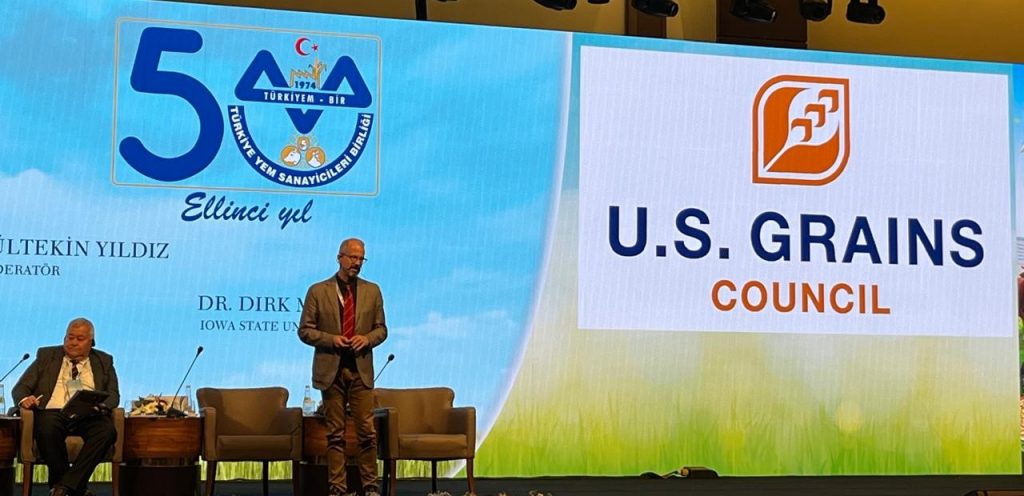This past week in Turkey, the U.S. Grains Council (USGC) took part in the 15th International Feed Congress and Exhibition (TUYEM), organized by the Turkish Feed Manufacturers Association.
The event, organized by the association since 1992, brings together all sectors related to the feed business. With the participation of thousands of local and foreign attendees, TUYEM holds the distinction of being the world’s largest congress on compound feeds. The Congress disseminates new information in feed and animal production and fosters the emergence of new business opportunities and collaborations.
“Turkey‘s feed production has surged by approximately 400 percent in the last two decades, reaching 28 millon metric tons (MMT) in 2023 and boosting demand for those feed ingredients including corn and corn co-products. Although U.S. corn faces stiff competition from the Black Sea origins, U.S. high-value co-products continue making their way into this market. In 2023, Turkey was the sixth-largest export partner for U.S. DDGS, with 628,000 MT, including 100,000 MT of containerized exports. The Council has been active in introducing U.S. DDGS producers and exporters, executing trials and providing educational opportunities for Turkish industry leaders. As the efforts have paid off, the Council needs to make sure it remains a relevant partner for the Turkish feed industry. Participating at their event and providing a speaker builds on this effort,” said Ana Ballesteros, USGC deputy regional director for Europe and the Middle East.
Dr. Dirk Maier, a professor of grain and feed operations and processing at Iowa State University and director of the university’s Department of Agricultural and Biosystems Engineering, spoke on behalf of the Council during the program, highlighting advancements in feed technology. Artificial intelligence, operational efficiency and measurement technology were all featured during Maier’s presentation.
“The Turkish Feed Millers Association was interested in providing its stakeholders with information aiming to enhance feed production efficiencies. Due to the inability of the country’s crop production to match the pace of animal production, a considerable amount of raw materials used in compound feed production are sourced from abroad. Consequently, the feed sector is directly impacted by foreign market prices and fluctuations in exchange rates,” Ballesteros said.
“The Council was able to provide value to the feed industry through Dr. Maier’s presentation on the advances in feed technology. Maier’s research program focusing on post-harvest engineering applied to grain and feed operations and processing made him an ideal candidate to speak during the event.”
In addition to Maier’s presentation, other topics at the event included sustainability in feed production, global developments in the compound feed industry and the future of alternative protein sources and biotechnology. This year’s event also celebrated the 50th anniversary of the Turkish Feed Manufacturers Association.
By taking part in this event, the Council expects to strengthen its relationship with the Turkish Feed Manufacturers’ Association and other relevant players who were in attendance. It was also an opportunity to gather market intelligence about corn and corn co-products in the country and identify opportunities to increase sales of distiller’s dried grains with solubles (DDGS) and corn fermented protein (CFP).
While there is significant adoption of the use of corn and corn co-products in the Turkish feed industry, there are still opportunities for increased inclusion rates, as inclusion rates tend to be conservative.
About The U.S. Grains Council
The U.S. Grains Council develops export markets for U.S. barley, corn, sorghum and related products including distiller’s dried grains with solubles (DDGS) and ethanol. With full-time presence in 28 locations, the Council operates programs in more than 50 countries and the European Union. The Council believes exports are vital to global economic development and to U.S. agriculture’s profitability. Detailed information about the Council and its programs is online at www.grains.org.

